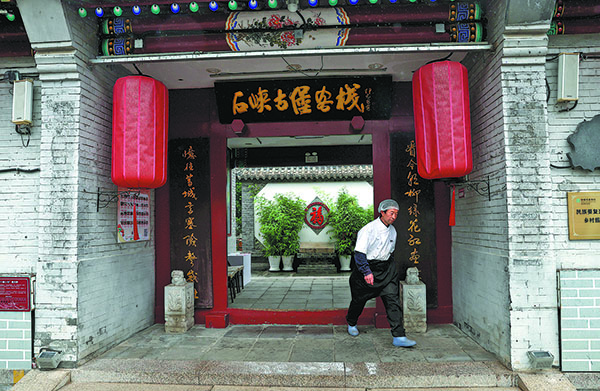

A prominent figure in the village's tourism development is He Yuling from Yanqing district. An entrepreneur in the catering industry in central Beijing, she observed the trend of city dwellers going to the countryside for weekends, and thought of establishing a high-quality countryside getaway. Then, a trip to Shixia in 2014 revealed to her an ideal spot for her vision.
"At the time, the village was full of old houses and courtyards, but the local community was very welcoming, and the aging buildings were well-maintained and clean," she recalls.
"What I saw in it was its rich historical and cultural resources. The Great Wall is visible from almost anywhere in the village, and it has historical remains. The natural scenery was stunning, with lush vegetation and flowers blooming all over the mountains in spring."
She rented 20 courtyards from local villagers and transformed these into her own brand, the Stone Light Hotels. Each of these courtyards has its own characteristics, but overall the designs kept the buildings' original simplicity, coziness and antique flavor.
Along with the guesthouses, her company also set up public spaces such as the cafe and bookshop to enrich the lives of residents and tourists alike, and involved the locals in establishing a brewery, a teahouse and an oil mill, which allows visitors to learn about folk culture and help the villagers sell local specialties.
Since the guesthouses opened in 2015, she has been providing villagers over 65 with an egg and a packet of milk every day, and the guesthouse employees also participate in the village's Great Wall preservation.
"Although my hometown is 30 kilometers away from Shixia, I've always considered myself a local. The entire atmosphere of the village is harmonious. It feels like a big family with the villagers and the visitors," she says.
In her observations for the past decade, what has changed about Shixia is not only the environment, but also the villagers' increasing awareness of the preservation of their historical and cultural resources.
For the next steps, Li says that the village aims to continue to make good use of its natural and historical resources to promote economic development and rural vitalization.
In the meantime, Great Wall preservation remains the most important. "It is an emblem of our Chinese civilization, and living right beside the Great Wall, we have been improving our living conditions because of it. So we will continue to protect the heritage. Even when our generation grows old, the future generations will take up the baton," Li says.